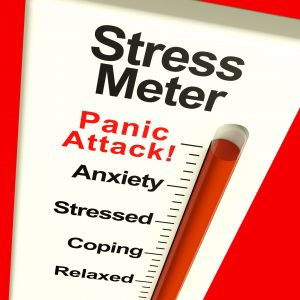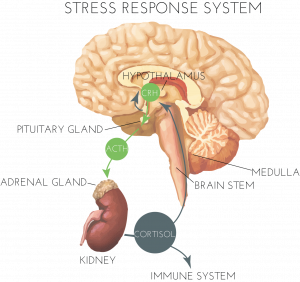Hormones and Stress
Hormones and Stress in the holiday season are upon us! Although this can be a fantastic time filled with love and laughter, it can also significantly increase the day-to-day stresses experienced by many people; this can quickly turn into chronic Stress.
Did you know that chronic Stress can significantly impact your normal hormonal responses? Read on to learn more about Stress’s effects on your body and what you can do about it.
The Hormones and Stress feeling we know so well is part of the body’s normal response to a real or perceived threat. However, your body does not differentiate between severe physical threats and “normal” pressures. So a heavy workload or demands from your family can build up over time and harm your health.
The stress response, commonly known as the “fight or flight” response, begins in the brain. When Stress is perceived, the amygdala sends a signal to the hypothalamus, which activates the sympathetic nervous system and triggers the release of adrenaline from the adrenal glands into the bloodstream.
Adrenaline accelerates the heartbeat to pump more blood to the muscles in preparation for “flight.” In addition, the pulse, blood pressure, and breathing rate all increase to enhance the amount of oxygen inhaled. Other senses, such as sight and hearing, become sharper.
The Normal Stress Response
During the second phase of the stress response, the hypothalamus releases corticotropin-releasing hormone (CRH), which stimulates the release of adrenocorticotropic hormone (ACTH).
ACTH then stimulates the release of cortisol from the adrenal glands, ensuring the body remains on “high alert.”
Cortisol levels remain elevated until the threat passes; the stress response is then shut down once the brain perceives the danger is no longer there (http://www.health.harvard.edu/staying-healthy/understanding-the-stress-response).
The Effects of Stress
Prolonged periods of Stress prevent the shut-down of the normal stress response because the body remains on high alert and produces cortisol. Long-term exposure to cortisol and other Hormones and Stress has several adverse effects throughout the body.
Including
- In the respiratory system, the accelerated breathing rate could lead to asthma or panic attacks (http://www.apa.org/helpcenter/stress-body.aspx).
- In the cardiovascular system, prolonged periods of an elevated heart rate and increased blood pressure can increase the risk of cardiovascular disease, heart attack, and stroke.
- The increased cortisol levels in the liver stimulate glucose production in anticipation of increased energy demands. Such prolonged exposure to elevated blood glucose levels might increase the risk of metabolic syndrome and type 2 diabetes.
- Some animal studies have suggested that chronic Stress can reduce testosterone levels and sperm production and maturation in men; it can even lead to erectile dysfunction and impotence.
- Chronic Stress can lead to an irregular menstrual cycle, worsened premenstrual syndrome symptoms, and reduced libido in women.
- Stress can also dampen the immune system.
- Emotionally, Stress can affect your sleep, increase irritability, anxiety, and depression, and reduce concentration.
How to Reduce the Effects of Stress
There is no need to worry: there is a lot you can do to counteract the natural stress responses that occur at this time of year. Understanding what makes you stressed and what makes you relax is essential.
For example, Several lifestyle changes can help reduce Stress.
(http://www.webmd.com/balance/stress-management/stress-management-relieving-stress):
- Take time out to do something you enjoy
- Express your feelings
- Use relaxation techniques such as meditation
- Exercise regularly; exercise is one of the best ways of reducing Stress
Because many chronic stress symptoms are also associated with low hormones, such as sleep loss, fatigue, and low testosterone levels, we recommend checking your Hormones and Stress levels if you experience any prolonged, unusual, or unexplained Stress.
At AAI Clinic, we can measure your Hormones, Testosterone Injections, and Stress and make recommendations regarding any hormone replacement therapy or supplements that could alleviate your stress-related symptoms.
Testosterone Injections – Curious about testosterone injections Therapy? Read more about what you can expect from this treatment and contact us for more information at (866) 224-LowT (5698)
References:
- Golbidi, S., J.C. Frisbee, and I. Laher, Chronic Stress impacts the cardiovascular system: animal models and clinical outcomes. Am J Physiol Heart Circ Physiol, 2015. 308(12): p. H1476-98.
- Bergmann, N., F. Gyntelberg, and J. Faber, The appraisal of chronic Stress and the development of the metabolic syndrome: a systematic review of prospective cohort studies. Endocr Connect, 2014. 3(2): p. R55-80.
- Kalaitzidou, I., et al., Stress management and erectile dysfunction: a pilot comparative study. Andrologia, 2014. 46(6): p. 698-702.
- Gannon, L., et al., Perimenstrual symptoms: relationships with chronic Stress and selected lifestyle variables. Behav Med, 1989. 15(4): p. 149-59.
- Golkar, A., et al., The Influence of Work-Related Chronic Stress on the Regulation of Emotion and Functional Connectivity in the Brain. PLoS ONE, 2014. 9(9): p. e104550.
**NOTE** The content in this blog is subject to interpretation and is the opinion of the content writer. We do not claim it to be fact. We encourage you to consult a medical doctor before taking any prescribed medications or supplements.
Conclusion
Supporting Hormones health is essential for overall well-being and vitality. By incorporating regular exercise, proper nutrition, adequate sleep, stress management techniques, and IV therapy, you can help maintain optimal testosterone levels and lead a healthy, balanced life. Always consult a healthcare professional before making significant changes to your lifestyle or starting any new treatments to ensure they suit your needs.
At AAI Rejuvenation Clinic, we advise anyone to think seriously about beginning Hormone treatment if there is no medical need for it. However, we will take every precaution to ensure that you read your program’s positive benefits by providing the latest at-home hormonal mouth-swab testing to ensure we are continually monitoring your progress and aware of any adverse side effects. Fill out the Medical History Form, or if you need more information, call us at (866) 224-5698 or (866) AAI-Low-T.
Low Hormone Symptoms
- Motivation
- Sex Drive and Desire
- Depression
- Fatigue
- Erectile Dysfunction
- Cholesterol
- Low Energy
- Memory Loss
- Osteoporosis
- Wounds & Illness
- Muscle Mass
- Sleep Disturbances
- Thyroid Dysfunction
- Weight Gain
]]>





